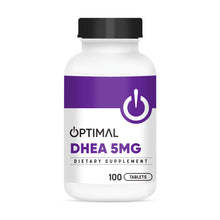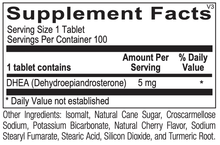- Description
- Benefits
- Supplement Facts
- Other Resources
Clinical Applications
- Promotes Healthy Hormonal Balance
- Supports Mood Regulation
- Balances the Stress Response System by Improving Cortisol-to-DHEA Ratios
- Maintains Healthy Aging and Normal Inflammatory Balance
- Supports Bone Health
Dehydroepiandrosterone (DHEA) is a steroid hormone precursor, which helps maintain healthy hormone levels and helps support the stress response system. DHEA functions as the counterpart to the stress hormone cortisol. Maintaining healthy DHEA levels is crucial for balancing the catabolic effects of cortisol.
DHEA and its sulfate, DHEAs, are the most abundant steroid hormones in the human body and can be found in blood, saliva, urine and cerebrospinal fluid (CSF). DHEA serves as a “buffer” reservoir to be used for the intracellular synthesis of various estrogens and androgens throughout the human body. DHEA production peaks during the second decade of life. Beginning in the early 1930s, DHEA levels typically decline by 10% per decade. In addition to the normal decline associated with aging, other possible causes of a decline in DHEA production include inflammation, blood sugar imbalances, and long-term stress.
Suggested Use:
1 capsule per day or as recommended by your health care professional.
Mood Regulation
Elevated cortisol levels can play a major role in normal mood regulation. DHEA counterbalances high levels of cortisol and also brightens mental outlook. DHEA can easily cross the blood-brain barrier, which is crucial for supporting brain function. Supplementation with DHEA has been shown to support mood regulation by increasing levels of β-endorphins, quieting glutamate (N-methyl-D-aspartate) receptors and protecting against the effects of glucocorticoids in the brain.
Bone Health
DHEA has been examined in numerous studies for its role in supporting bone health. Possible theories regarding DHEA's ability to support bone health include DHEA functioning as a precursor for the formation of estradiol and androgens, which promotes healthy bone formation by increasing levels of insulin-like growth factor.
Inflammatory Balance
DHEA has been shown to maintain normal inflammatory balance by inhibiting the activation of nuclear factor-kβ and the secretion of inflammatory compounds such as IL-6 and IL-2. Maintaining normal inflammatory balance has been shown to be crucial in patients with gastrointestinal challenges.
Aging
Research has indicated that DHEA naturally supports healthy aging.
Hormonal Balance
DHEA is a precursor to estrogen and testosterone. In addition, DHEA may also have physiological actions unrelated to its function as a hormone precursor, as DHEA receptors are also present in human muscle cells. Clinical studies using oral doses of DHEA have demonstrated its ability in maintaining hormonal balance.

Sign up for weekly offers, news and advice
Plus 15% off your first order

Free shipping for all orders over $125
- Choosing a selection results in a full page refresh.
- Press the space key then arrow keys to make a selection.






